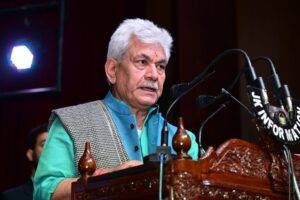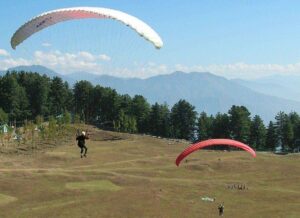Last Updated on January 14, 2021 at 4:33 pm
SRINAGAR: As the cold wave in the valley persisted with Srinagar registering the coldest night in 30 years, officials said here, a large portion of Kashmir’s famed Dal Lake and many other water bodies froze. Srinagar reported a low of minus 8.4 degrees Celsius, the coldest temperature recorded in the region in thirty years, a MET department official said.
The temperature fell to minus 11.3 degrees Celsius in 1991, he said, while Srinagar reported minus 8.3 degrees Celsius in 1995. In 1893, the lowest temperature ever recorded was minus 14.4 degrees Celsius in Srinagar. In the extreme cold, the rest of the valley was reeling as well.
Also Read: Administration clears snow from 18000 km road length in Kashmir
The tourist town of Pahalgam, which also acts as a base camp for In South Kashmir, the annual Amarnath Yatra registered a low of minus 11.1 degrees Celsius, up from minus 11.7 degrees Celsius the previous night.
In Jammu and Kashmir, Gulmarg was the coldest reported location. The minimum temperature at the tourist destination of Gulmarg was minus 7 degrees Celsius the night before, up from minus 10 degrees Celsius.
Qazigund reported a minimum of 10 degrees Celsius as the gateway to the valley, compared to minus 1.4 degrees Celsius a day before. In northern Kashmir, Kupwara reported a low of minus 6.7 degrees Celsius, while in the south, Kokernag recorded a low of minus 10.3 degrees Celsius.
Also Read: Tourist bodies in Kashmir come together to help tourists stranded due to heavy snow
Due to the bone chilling cold, large regions of several water bodies, including Dal Lake, have frozen. The dip in the minimum temperature has contributed to the freezing of the pipes providing water. In the city and elsewhere in the valley, a dense sheet of ice has accumulated over some highways, making it impossible for vehicles to travel.
Currently, Kashmir is under the influence of ‘Chillai-Kalan’—the 40-day harshest winter cycle when a cold wave reaches the area and the temperature drops drastically, leading to the freezing of water sources, including the famous Dal Lake here, as well as the availability of water.
The chances of snowfall during this time are the most regular and highest, and most areas experience heavy snowfall, especially in the higher reaches.
Also Read: Snowfall to heal Kashmir’s tourism sector injured by continuous lockdowns
The cold wave persists even after that in Kashmir with a 20-day-long ‘Chillai-Khurd’ (small cold) and a 10-day-long ‘Chillai-Bachha’ while ‘Chillai-Kalan’ that started on December 21–will end on January 31, (baby cold).



